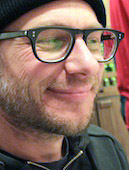Why Geography?
I came to geography a little bit later than some of my colleagues. My background and training are in english and philosophy, so kind of critical theory in philosophy. It wasn’t until I was working on my Ph.D. at the University of Kentucky in the English Department as sort of a 21st Century American that I discovered geography. I’d discovered geography once earlier when I was a kid in grade school, but I got turned off of geography initially on September 22, 1984 when I was in my geography class in third or fourth grade and was coloring a map of the United States and was doing the blue for the oceans and the right side of the map and the left side of the map, and then I started moving up to the north part where that northern ocean is there, and my teacher said, “Keith! Keith! What are you doing? Don’t do that!” I was basically drowning Canada. And I remember it on that date, because that was my birthday. We must have been terrible that day, because the teacher snapped at me, and I just started crying and crying. I rediscovered it in the early 2000’s, when I was at Kentucky and involved in the Social Theory program there which incorporates various social scientists and humanities. That was when I started learning what human geographers work on, which was kind of what I was working on over in the English Department, but there was this kind of ability of going out into the world and actually working on these problems with real human beings, rather than just books. That, and the really special way that they were doing human geography at Kentucky at the time. I just fell madly, madly in love and started to change right away. Sarah Moore and I were in one or two classes together, one of which was with David Harvey.
What excites you about geography?
I love the possibility of bridging theoretical problems that grow out of philosophical and critical works with actual empirical questions. I really love the tradition that sort of emerged at the end of the 19th Century and the beginning of the 20th Century through thinkers and philosophers who were suddenly going into laboratories and trying to think science and philosophy at the same time. That particular intersection I find incredibly attractive. The thing about geography is that, first of all, it is very into that particular intersection and into thinking through it. But geography is also—possibly because we cover so much ground from the physical sciences to the social sciences and leaning over to the humanities—we don’t have a lot of the rigidities. We are a little bit more flexible than a lot of the other social sciences. That means that, whereas some folks in a lot of the other social sciences might be inclined to tell you, “No, that’s not the way we do it.” geographers tend to be a bit more like “Well, how would we do that?” and I find that particularly attractive. It is the thing I love about geography.
Why Madison?
Where else can you do that? I mean, where else do you have the department that really celebrates all of the diversity of the discipline and pulls together to try and make all of those as likely as possible. This is a really rare and unique space. Its not unusual to land in a department where physical and human geographers are fighting each other. They don’t talk. I find that very strange. Especially in a time when—like now, with gigantic global-sized environmental crises—what you need more than anything else is social scientists and physical scientists talking to each other. We do that in house and we do it really well here.
That, and 2011 was a really special and interesting time for this Department as well. When there were political struggles happening around Madison—that’s sort of what I do so, of course, I was active and involved in them—it was an amazing moment where I would see physical geographers marching up the street to the capitol every day for protests and things like that; that’s mind-blowingly beautiful. I love this Department for all those reasons.



